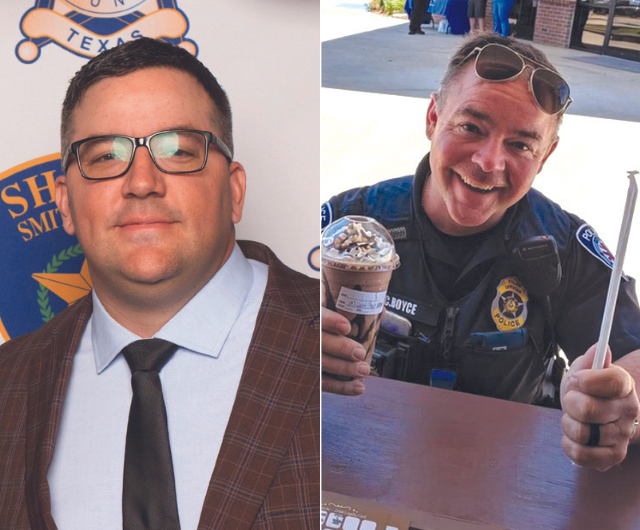It’s a memory that still causes retired Smith County deputy Michael Lunsford to think about the thin line between life and death.
He and other officers answered a call to the home of a drug addict who claimed to be holding hostages and threatened to kill them if he didn’t get a fix.
The situation escalated when the man exited the home with a rifle, ordered the officers to kill him or he would kill them. The officers pleaded with him to drop the weapon.

“When he was walking towards me, the thought was going through my head: ‘Am I going to have to pull the trigger?’” Lunsford recalled. “Because I don’t want to be a statistic. I wanted to be able to go home that night. I wasn’t going to choose him over me because he chose to be there.”
When the man finally dropped the rifle, Lunsford performed a running tackle, knocking the wind out of both men, but preventing a possible disaster.
The man’s demeanor changed from cursing the officers to apologizing.
“He didn’t have any mental illness, but he’d had a panic attack because he didn’t have any drugs left,” Lunsford said. “Sometimes you are able to talk them down but that doesn’t always work, and you can try non-lethal weapons but if that doesn’t work, you have to get physical with them.”
De-escalation — the act of making a situation less dangerous or difficult — and other “crisis management techniques” have become buzz words as violence has reached the level of what some experts consider a public health crisis in America.
Although it is a skill most often associated with law enforcement, first responders and counselors, knowing how to de-escalate a situation also is important in work and business environments. A blog post in 2021at deemed de-escalation as the most necessary management skills.
Experienced counselors say the key to de-escalating a situation is understanding an individual’s personal situation and condition while focusing on their needs.

“It’s a matter of just understanding their diagnosis and their perception because arguing with someone who is in a mental health crisis can be like baptizing a cat — you’re not going to get anywhere like that,” said Nikki Thomas, the business development director at More Than Rehab.
The organization operates an inpatient facility for chemically dependent individuals in Bryan-College Station and an outpatient facility in Tyler.

Thomas and Karen Reeves, a licensed counselor at The Haven, a Level 4 medical detox center in Tyler, said the way they work to remain calm and attentive to the other person is important in de-escalating a situation.
Reeves said in her experience removing other people surrounding an irate person helps create a calm, private atmosphere while increasing safety.
“More people are going to be reactive and want an audience,” she explained. “Because they weren’t having that attention on them, they would start calming down because they weren’t being fueled by anything. They were then able to talk things out to resolve the situation in that private space without people watching.”
She said other key techniques include:
- Offering encouragement.
- Asking open-ended questions promotes a conversation in which the person can fully express themselves.
- Reflecting on their feelings.
- Remaining aware of one’s own tone, posture and body language.
“I constantly remind them I am here to help … and try to regain the situation,” Reeves said.
For Thomas, the interaction is relational — keeping calm, speaking in a consistent, inflective tone.

“I sit with them and make eye contact … and don’t show if you’re intimidated, worried or concerned,” she explained. “You definitely don’t show any signs that you are walking on eggshells because most people who are escalated, when someone is tentative around them, they feel that energy. Knowing someone is afraid to be around them or talk to them just adds fuel to the fire.”
Thomas also emphasized the need to understand the situation as the other person perceives it. She said she asks them to explain their situation so she can understand what that person needs.
“Having them educate you is kind of putting that power in their hands and at the same time, getting the information you need,” Thomas said.

Reeves works with Tyler law enforcement officers Sgts. Robert Garcia and Chuck Boyce training de-escalation techniques to first responders statewide. Thomas recently joined Reeves in this endeavor.
The connections made through training classes also provide opportunities to coordinate a full range of treatment to more citizens, Reeves said.
“It definitely takes a village — it takes a lot of us working together,” she said.
The Texas Commission on Law Enforcement mandates de-escalation training and 40 hours of crisis management for law enforcement officers.
TCOLE oversees training, licensing, proficiencies and certifications in the police academy.
Garcia teaches the academy crisis intervention training classes and in-service training for active current law enforcement.
He said the training helps develop empathy and to identify signs and symptoms of mental illness, as well as increasing awareness of all available resources for citizens.
“I like to put it in the perspective that one out of every four or five adults suffer from mental illness, so the odds are pretty high for us to deal with that,” Garcia said. “I ask them if you had a family member suffering from a mental health crisis, what kind of an officer would you want responding to them?”
De-escalation and crisis intervention training as a whole, benefits not only the citizens they deal with day in and day out, but also the officers, their personal lives and family members, he said.
Boyce, a master police officer and current president of East Texas Peace Officers Association, said ETPOA also plays a role in continued training of law enforcement officers, as well as offering scholarships for students and networking. All work done for ETPOA is on a voluntary basis.
Most officers in the field agree on training tactics and utilize ways of speaking — words referred to as “verbal judo” — in hopes they are effective enough to avoid use of lethal weapons, said Lunsford, who also is a master peace officer.
Negotiating techniques are commonly used too so police can offer the escalating person(s) something else to focus on and convince them how it would be better to give themselves up, rather than do something hurtful, he said.
“In all my working years, I am thrilled that I never had to pull the trigger,” Lunsford said. “I’ve come close quite a few times, but luckily, I didn’t have to shoot anyone.”
Lunsford retired from the Smith County Sheriff’s Office after 20 years and was with Lindale Police Department for five years.
Regardless of officers’ training or skill level, the use of force is occasionally necessary although it adds another level of stress for everyone involved, he said.
“Sometimes it’s going to turn into a use of force situation or God forbid, a deadly force situation, but these are the things we are trying to avoid,” Garcia said.
Boyce encountered a Vietnam veteran who was intoxicated, in a wheelchair and experiencing a “very bad day.” He said he felt a lot of empathy since his own dad is a Vietnam veteran.
The situation presented officers with possible legal options: arrest him for public intoxication; transport him to the hospital for mental custody; or have him voluntarily commit himself for welfare care.
“He had already drunk four “Four Locos” and had two more he was about to down. I mean you’re only allowed two of those a day,” Boyce said.
Drinking just two Four Locos in one hour is equivalent to chugging 10-12 beers and the human body cannot metabolize alcohol that quickly, he explained.
“This man was just not going to go to the hospital, so we literally were going to have to arrest this gentleman,” Boyce said.
He talked with the man, asking him when was the last time he had eaten. Boyce then offered to buy him a hamburger, fries and a drink if he would agree to go to the hospital.
“Man, he started rolling that chair towards that ambulance and we were done; just from being human and offering to buy him a cheeseburger,” he said. “The key thing is just to listen and have empathy and treat them like you’d want your family treated.”
Boyce also recalled a lady living in her truck and suffering from severe gangrene. She refused medical treatment. He and his partner decided to purchase a hotel room for her for three days.
Their offer allowed the woman to take a shower and sleep in a bed for several days before moving on.
“Our officers do so much,” Boyce said. “There are so many things that are not seen that we do,” he said. “We don’t do this job for the money. It is for the love of the job and making a difference.”
Garcia, who worked as a crisis intervention team deputy for Smith County before being promoted to patrol sergeant, said helping others is his passion.
“I’ve always been a champion for the underdog or that part of society who people tend to cast off,” Garcia said. “If you can build empathy and bring understanding to that community of people who are often been overlooked, pushed to the side and cast off, if you can just build some empathy there with law enforcement, then I think we’ve already begun to change the culture and the way we deal with people – more successes and better outcomes.”
Pamela Stokes is a freelance writer and tutor for Lufkin Independent School District. Born in Canada, Stokes moved to Texas for high school and graduated from Stephen F. Austin State University. She has worked for the Tyler Morning Telegraph Courier Times and Henderson Daily News. Stokes resides in Lufkin with her two Border Collie mixes.
Love what you're seeing in our posts? Help power our local, nonprofit journalism platform — from in-depth reads, to freelance training, to COVID Stories videos, to intimate portraits of East Texans through storytelling.
Our readers have told us they want to better understand this place we all call home, from Tyler's north-south divide to our city's changing demographics. What systemic issues need attention? What are are greatest concerns and hopes? What matters most to Tylerites and East Texans?
Help us create more informed, more connected, more engaged Tyler. Help us continue providing no paywall, free access posts. Become a member today. Your $15/month contribution drives our work.







